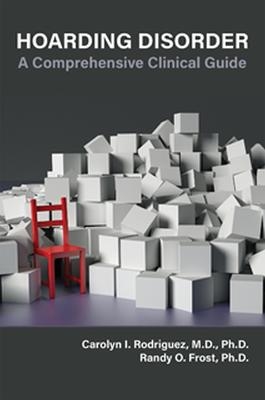
Hoarding Disorder
American Psychiatric Association Publishing (Verlag)
978-1-61537-336-9 (ISBN)
Accounts of hoarding behaviors have appeared in literature, as far back as 319 B.C.E. in the writings of Aristotle's student Theophrastus; in the news, like New York's infamous Collyer brothers in the 1940s; and more recently in popular reality television series.
But it wasn't until the publication of DSM-5 in 2013 that hoarding was classified as a disorder in its own right rather than as a symptom of obsessive-compulsive disorder or obsessive-compulsive personality disorder. In this single source, readers can access the most up-to-date comprehensive information on what is known about the disorder.
Drawing on the authors' own clinical experiences as well as the latest published research, Hoarding Disorder: A Comprehensive Clinical Guide examines key features of the disorder and treatment approaches, such as:
• Phenomenology, including diagnosis, comorbidities, and assessment
• Etiology, from both a cognitive-behavioral and a neurobiological perspective
• Psychotherapeutic and pharmacological treatments, from cognitive-behavioral therapy, harm reduction strategies, and community approaches to the efficacy of specific drugs
• Challenges, including working with elderly patients, managing cases of animal hoarding, and distinguishing and addressing squalor
Key points for each chapter and numerous case studies will help readers easily reference and retain information, and the appendices feature useful symptom rating scales that can be applied to practice.
For psychiatrists, psychologists, human service and other mental health professionals, peer support counselors, community advocates, and professionals in training, this invaluable book will improve the reader's knowledge and skill in treating patients with hoarding disorder, both those with straightforward presentations and those with complicated ones.
Carolyn I. Rodriguez, M.D., Ph.D., is Associate Chair and Associate Professor and Director of the Translational Therapeutics Lab in the Department of Psychiatry and Behavioral Sciences at Stanford University School of Medicine in Stanford, California. Randy O. Frost, Ph.D., is Harold Edward and Elsa Siipola Israel Professor Emeritus of Psychology at Smith College in Northampton, Massachusetts.
About the Authors
Preface
Acknowledgments
Part I: Phenomenology
Chapter 1. Introduction and History
Chapter 2. Diagnosis and Comorbidity
Chapter 3. Assessment
Chapter 4. Insight and Motivation
Part II: Etiology
Chapter 5. Cognitive-Behavioral Model
Chapter 6. Neurobiology
Part III: Interventions
Chapter 7. Cognitive-Behavioral Therapy
Chapter 8. Pharmacotherapy
Chapter 9. Harm Reduction
Chapter 10. Community
Part IV: Challenges
Chapter 11. Elders
Chapter 12. Animal Hoarding
Chapter 13, Squalor
Chapter 14. Future Directions
Appendixes
Appendix A: Structured Interview for Hoarding Disorder (SIHD)
Appendix B: Clutter Image Rating (CIR)
Appendix C: Saving Inventory—Revised (SI-R)
Appendix D: Hoarding Rating Scale (HRS)
Appendix E: Activities of Daily Living—Hoarding Scale (ADL-H)
| Erscheinungsdatum | 10.10.2022 |
|---|---|
| Zusatzinfo | 1 Charts; 1 Figures; 9 Tables, unspecified |
| Verlagsort | VA |
| Sprache | englisch |
| Maße | 152 x 229 mm |
| Themenwelt | Medizin / Pharmazie ► Medizinische Fachgebiete ► Psychiatrie / Psychotherapie |
| ISBN-10 | 1-61537-336-5 / 1615373365 |
| ISBN-13 | 978-1-61537-336-9 / 9781615373369 |
| Zustand | Neuware |
| Haben Sie eine Frage zum Produkt? |
aus dem Bereich


